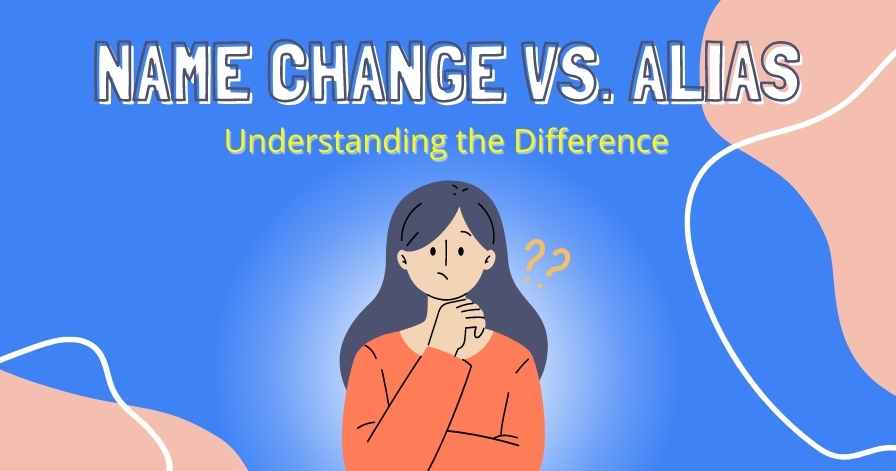Our identities are an integral part of who we are as individuals. However, there are instances in life where one may feel the need to alter or use a different name for various reasons. This can be done through either change name or the adoption of an alias. While these two concepts may seem similar at first glance, they carry distinct legal and personal implications. In this article, we will delve into the differences between name change Vs alias, shedding light on their respective meanings and contexts.
What is Name Change?
A name change refers to the legal process of modifying one's name officially. This process typically involves filing a formal application with the appropriate authorities, such as a government agency or court, and following specific legal procedures. The reasons for seeking a name change can vary widely, ranging from personal preference to marriage, divorce, or gender transition. Once the name change is granted, it becomes the individual's new legal name and replaces their previous name on all official documents.
What Do You Understanding by Alias?
On the other hand, an alias is a pseudonym or alternative name adopted by an individual to conceal their true identity or for other personal reasons. Unlike a name change, an alias is not obtained through a legal process. Instead, it is a self-assumed name used for specific purposes, such as writing under a pen name, performing under a stage name, or for privacy and security reasons. An alias is not recognized as the person's legal name and does not have any official standing.
What are the differences between Alias Vs Name Change?
There are various differences between name change vs Alias. Have a look at some of the major differences between these two.
Legal Implications
One crucial distinction between a name change and an alias lies in their legal implications. When someone legally changes their name, it affects their identity on various legal documents, such as their driver's license, passport, social security card, and other official records. A name change requires proper documentation and may involve notifying relevant institutions, including banks, employers, and educational institutions, about the change.
On the other hand, an alias does not have the same legal weight. While an individual can use an alias in their day-to-day life, it does not change their legal identity. Official documents and records will continue to display the person's birth name unless they have legally changed it. Using an alias may provide some level of privacy or protection, but it does not grant the same rights and responsibilities as a name change.
Public Perception and Purpose
The perception and purpose of a name change and an alias also differ significantly. A name change is often pursued for personal or cultural reasons, reflecting an individual's desire to align their identity more closely with who they are or aspire to be. It may carry emotional significance, signaling a fresh start or a transition into a different phase of life. A name change is usually a public declaration, with the individual openly adopting the new name and informing friends, family, and acquaintances about the change.
Related - What is a Gazette Certificate for Name Change? and Who is a witness in Marriage Registration?
An alias, on the other hand, is often chosen for more practical reasons. Writers, artists, and performers may adopt an alias to create a distinct brand or separate their personal and professional lives. Similarly, individuals seeking privacy or protection may use an alias to shield their true identity from the public. The purpose of an alias is to create a separate persona while maintaining a level of anonymity or security.
Flexibility and Reversibility
Another aspect worth considering is the flexibility and reversibility of a name change and an alias. A name change is a relatively permanent alteration to one's legal identity. Reverting to the previous name or adopting another legal name requires following another legal process, which can be time-consuming and may involve additional expenses.
On the other hand, an alias offers greater flexibility and can be easily changed or abandoned. Since an alias is not legally binding, individuals can adopt multiple aliases for different purposes or discard an alias altogether if it no longer serves its purpose. There is no legal procedure involved in changing or abandoning an alias. Individuals have the freedom to switch aliases as needed without any formalities or legal implications.
Recognition and Documentation
A significant difference between a name change and an alias is the level of recognition and documentation associated with each. A legally changed name is recognized by government agencies, financial institutions, and other entities as the person's official name. It appears on legal documents, identification cards, and official records, providing a clear and verifiable connection to the individual.
In contrast, an alias lacks the same level of recognition and documentation. While individuals may widely use an alias in certain contexts, it is not universally acknowledged or accepted as their legal identity. Official records and documents will continue to reflect the person's birth name, and using an alias may require additional explanation or verification in certain situations.
Conclusion
Understanding the difference between a name change and an alias is crucial when it comes to legal status, personal identity, and public perception. A name change involves a formal legal process, resulting in a new legal identity and replacing the previous name on official documents. On the other hand, an alias is a self-assumed name used for specific purposes and does not hold the same legal weight.


No comments yet